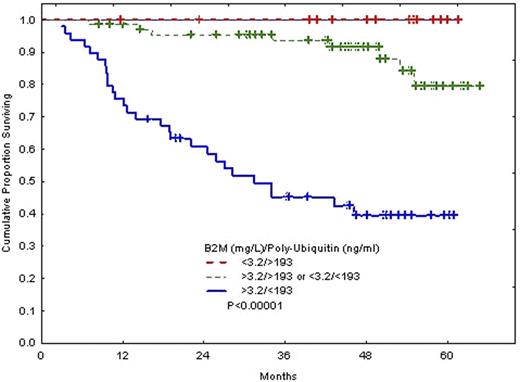Abstract
Abstract 1240
Poster Board I-262
The ubiquitin-proteasome pathway is implicated in the pathogenesis of many hematological malignancies. We have reported that proteasome activities in plasma samples can be detected in patients with chronic lymphocytic leukaemia (CLL). Here we examined the correlation of plasma ubiquitin protein levels with clinical behavior in CLL patients. Using the Meso Scale Discovery (MSD) platform, we quantified poly-ubiquitin levels in plasma samples from 138 patients with CLL and 101 healthy control subjects, and examined the associations of ubiquitin levels with various clinical and laboratory variables and overall survival. Patients with CLL had significantly higher levels of poly-ubiquitin proteins (median=158.2; range=35.0-281.2) than did normal control subjects (median=57.3; range=22.0-160.2) (P<0.001). Poly-ubiquitin levels showed no correlation with Rai stage, performance status, beta-2 microglobulin (B2M), or the mutation status of IgVH. However, when considered as a continuous variable, poly-ubiquitin levels correlated negatively with survival. Higher levels of poly-ubiquitin were associated with longer survival (P=0.04). In a multivariate model incorporating poly-ubiquitin, B2M, and IgVH mutation status only B2M (P=0.00004) and poly-ubiquitin P=0.04) levels, but not IgVH mutation status (P=0.12), were independent predictors of survival. When a cut- point corresponding to the upper quartile was used, patients with poly-ubiquitin levels >193 ng/mL had significantly better survival than did those with lower levels. Using B2M and poly-ubiquitin in combination allowed us to stratify patients into 3 different groups : survival was greatest in patients with high poly-ubiquitin and low B2M levels, lowest in those with low poly-ubiquitin and high B2M levels, and intermediate in those with high levels of B2M and ubiquitin or low levels of both (P<0.00001). In conclusion, these findings confirm the importance of the proteasome-ubiquitin system in the pathophysiology of CLL. Moreover, our data also suggest that plasma levels of poly-ubiquitin, along with B2M, should be explored as a prognostic factor in CLL.
No relevant conflicts of interest to declare.
Author notes
Asterisk with author names denotes non-ASH members.


This feature is available to Subscribers Only
Sign In or Create an Account Close Modal